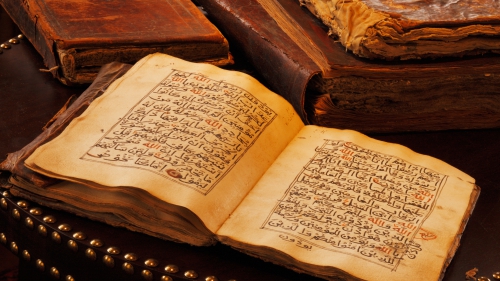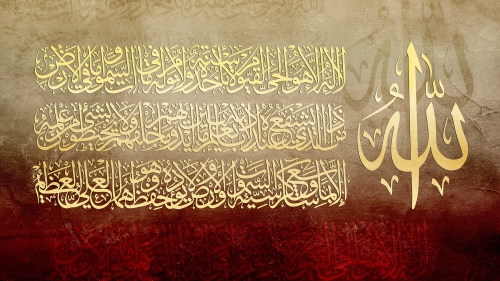Different Outcome for Different People

In the name of God, the Lord of Grace, the Most Merciful
A. L. M. These are Verses of the Wise Book,- A Guide and a Mercy to those who excel in doing good, attend regularly to prayers, give in charity and are indeed certain of the hereafter. These are on (true) guidance from their Lord: and these are the ones who will prosper.
Among people there are some who would pay for idle talk, so as to lead people astray from the path of God, without knowledge, and thus they turn it to ridicule. For such people there is shameful suffering in store. When Our revelations are conveyed to such a person, he turns away in his arrogance as though he had not heard them, as though there were heaviness in his ears. Give him, then, the news of painful suffering.
Those who believe and do righteous deeds shall have gardens of bliss in which to abide in accordance with God's true promise. He alone is Almighty, Wise.
He has created the skies without any supports that you can see, and has placed firm mountains on earth, lest it sway with you, and has scattered through it all manner of living creatures. We send down water from the skies to cause every kind of goodly plant to grow on earth in pairs.
(Quran. 31:1-10)
 |
As it began its first presentation of the great issue of faith, the surah gave us an image of the good believers who "excel in doing good, attend regularly to prayers, give in charity and are indeed certain of the hereafter." These are the ones who follow their Lord's guidance and are certain to be successful in the hereafter. The surah then paints to a totally different type of people who reject the faith. The first quality of these is that they are given to idle talk.
Idle talk is any type of talk that distracts hearts and kills time without yielding any benefit to humankind or his mission on earth. Let us remind ourselves that man's mission is to build human life on the basis of goodness, justice and righteousness. Islam defines this mission, its nature, limits and means, charting the way it should follow. The Qur'anic statement here is generally describing a type of person that always exists.
"Among people there are some who would pay for idle talk." Such people would pay money, time and life to buy such idle talk. How high the price, and cheap the commodity in which such people spend their lives. They buy such talk "so as to lead people astray from the path of God, without knowledge, and thus they turn it to ridicule." They are truly unaware. Their action is neither based on sound knowledge, nor aims for a wise objective. They have bad intentions and aims. They want to use such idle talk to lead themselves and others astray from God's path. They are ill-mannered and mock the way God has laid down for people's lives. Hence, the Qur'an issues a strong warning to such people. It shows them as contemptible, even before it completes their picture: "For such people there is shameful suffering in store." The description of their suffering as shameful is deliberate for this replies to their mocking of the divine way of life.
Painting the image of this other party is then resumed: "When Our revelations are conveyed to such a person, he turns away in his arrogance as though he had not heard them." The image here is full of movement, showing this person as arrogant, turning away in pride. He is, therefore, decorated with shame and this makes us look at him with contempt: "as though there were heaviness in his ears." It is this heaviness that stops him from listening to God's verses. No person listens to these divine verses and then turns away so arrogantly. This description is completed with further ridicule: "Give him, then, the news of painful suffering."
By way of contrast, the surah speaks of the reward to be given to the good believers who act on the basis of their faith. It also provides some details of their success to which earlier reference was made: "Those who believe and do righteous deeds shall have gardens of bliss in which to abide in accordance with God's true promise. He alone is Almighty, Wise."
Whenever the Qur'an mentions reward, it precedes this by mentioning faith and good action. It is in the nature of the Islamic faith that it must never remain an idle belief that triggers no action. It must always be a living, active reality. Indeed, Islam hardly settles in a person's heart before it begins to establish itself in action and behavior. It reflects its nature and what it does to believers' consciences through its clear effects on people's lives.
Those believers who have translated their faith into good action "shall have gardens of bliss in which to abide." Their admission to heaven and their abode there simply fulfills God's true promise. The grace God bestows on His servant's means that He commits Himself to rewarding them generously for what they do for themselves, not for Him, as He is in no need of anyone. "He alone is Almighty, Wise." He is certainly able to fulfill His promise, and He is wise in all that He does, including creation, promise and fulfillment.
The ultimate proof of God's might, wisdom and all other issues mentioned in the surah is the great universe, whose creation no human being ever claims for himself or for anyone other than God. The universe is huge and awesome, reflecting harmony and coherence. It has a fine and elaborate system.
It captivates our hearts and readily faces human nature in such a way that it cannot turn away from it. Hence, it readily acknowledges the great Creator's oneness and declares anyone who associates partners with Him as erring, as those who transgress the bounds of clear truth: "He has created the skies without any supports that you can see, and has placed firm mountains on earth, lest it sway with you, and has scattered through it all manner of living creatures. We send down water from the skies to cause every kind of goodly plant to grow on earth in pairs. This is all God's creation. Show me, then, what others might have created! Surely, the wrongdoers are in obvious error."
Sayyid Qutb was an Egyptian intellectual author, associated with the Egyptian Muslim Brotherhood. He is best known for his work on redefining the role of Islam in social and political change, particularly in his books Social Justice and Ma'alim fi-l-Tariq (Milestones). His extensive Quranic commentary Fi zilal al-Qur'an (In the shades of the Qur'an) has contributed significantly to modern perceptions of Islamic concepts.
Related Suggestions
1. His argument for necessity of a revolution (bloody) to establish an Islamic Government.
2. That irrespective of your sect in Islam we can come together and "fight" the kuffar in order that Islam becomes the dorminant religion as the decree of Allah elucidates ...liyudhhirahu 'alad-dini kullih wa lau karihal mushrikun.
One may give excuse for Sayyid Qutb's idea No. 1 for the simple reason that he may have erred and got his idea from the Marxist ideology that was popular in the late 19th century and most of 20th century or is it?! In both cases neither the Prophet, the Sahabas, Tab'in on one hand nor those amongst the generations that followed them in deeds agree to these ideas as part of Islamic ideals. So we pray for forgiveness for this great scholar and ask that Allah rewards him in other major aspect of his lifetime achievements especially his matrydom at the hands of Abdul-nasser.

















